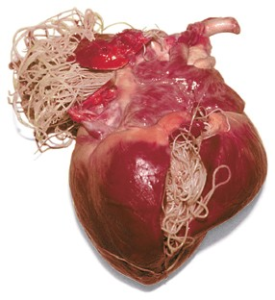Believe it or not, spring is coming. It’s time to protect your pet from Heartworm Disease!
There are a lot of misconceptions about heartworm disease. As mosquito season approaches, it’s time to clear the air.
What is Heartworm Disease?
Pets contract heartworm disease when bitten by a mosquito carrying the immature heartworm larvae. The immature heartworms are injected into the bloodstream. When they reach maturity, the worms live in the pet’s heart. Left untreated, heartworm disease can lead to heart failure and even death. Some pets who are treated for severe disease may survive treatment, but suffer long term cardiac disease as a result of infection. Cats can get heartworm disease too! Cats contract the disease less commonly. However, cats tend to be at higher risk of death from heartworm disease than their canine counterparts. Furthermore, the infection is harder for veterinarians to diagnose, as some cats will not test positive for heartworm disease despite having mature worms in the heart.
Is it contagious?
It is not directly contagious, but any dogs in the immediate vicinity of a heartworm positive dog are at increased risk for infection because the mosquitos in that region are at an increased risk of carrying the immature heartworms.
How do we test for this disease?
We screen for heartworm disease using a blood test. When run in the clinic it generally takes about 10 minutes, and only requires 3 drops of blood. If this test is positive, a slide of the blood is made to look for immature heartworms in the blood stream. Most owners do not know their dog has heartworm disease until the dog is showing the complications of heart failure (coughing, shortness of breath, exercise intolerance). It is important to note that it takes SIX MONTHS for a dog to test positive for heartworm disease after being exposed. This is one reason why preventative is so important, and why veterinarians recommend heartworm testing yearly. A dog should have a negative heartworm test before starting preventative, so March is a GREAT time to get started!
How is the disease treated?
Unfortunately this is not a disease that is cured with a few pills. Positive pets are evaluated, their disease is staged, and a treatment plan is formulated for each individual. The treatment involves a series of intramuscular injections and/or monthly heartworm medication. Any secondary effects of the disease (such as congestive heart failure) must also be managed.
The Important thing is… WE CAN PREVENT IT!
Monthly administration of an oral or topical preventative is very successful at preventing infection with heartworm disease. It is important to note that preventative works retroactively. The preventative kills the microfilaria that are already in the bloodstream BEFORE they can reach the heart. This is why monthly administration is so important, and why administering preventative year round is the best way to protect your pet!
What options for preventative are available?
This is something that is best discussed with your veterinarian, as each pet may have different requirements. Preventatives are generally administered once monthly, and come in several different forms. Remember that flea and tick preventatives are generally NOT heartworm preventatives, and most heartworm preventatives are prescription only. It is NOT acceptable to use canine products on cats. This can be very dangerous for the cat.









